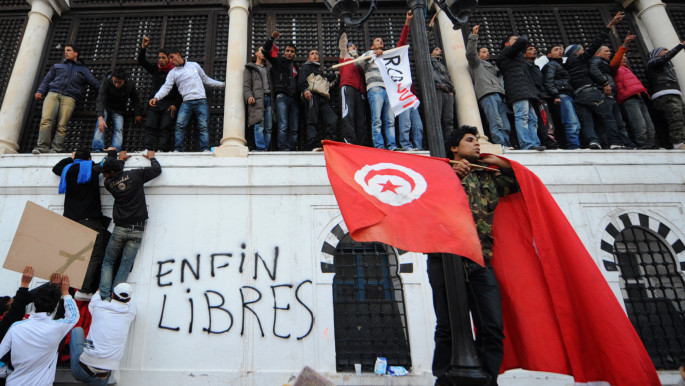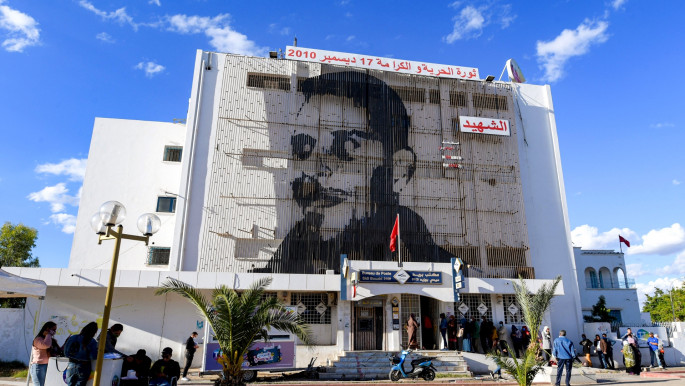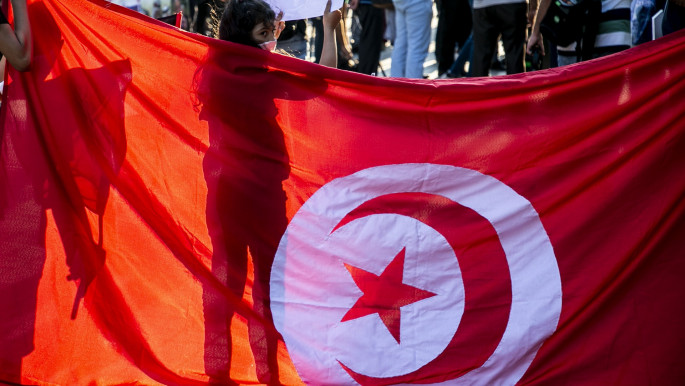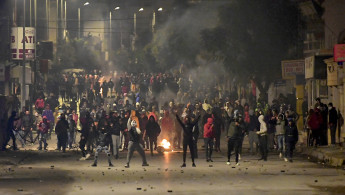How poverty and corruption are pushing Tunisia's disenfranchised youth back to the streets
Young people, who feel their voices are unheard, have grown increasingly exasperated by dire economic conditions, exacerbated by the coronavirus pandemic, and the failure of the political class to deliver.
Last Saturday saw a mass demonstration in central Tunis to protest police repression, corruption and poverty, and demand the release of youths detained during protests over the past week.
Hundreds of Tunisians, mostly young, rallied in downtown Tunis alongside a number of civil society organisations chanting slogans decrying the security forces' response to recent nationwide unrest, as well as calling for changes to the political system.
Chants popularised during the 2011 revolution such as 'the people want the fall of the regime' and 'work, freedom and dignity' could be heard in the crowd.
"The government must listen to the youth and take them seriously. We think they underestimate us," a girl called Ouiem from the 'Wrong Generation', a newly founded group of young anti-fascist activists, told The New Arab while marching from Habib Bourguiba Avenue. "Rioting is a result of repression, people have had enough!", said May, another young activist from the same group walking nearby.
 |
Youngsters here are left with nothing. It's either drug trafficking, criminality or illegal migration. They don't even have the right to dream in this country |  |
Nearby the Central Bank some banners read 'police everywhere, justice nowhere' and 'eat the rich, smash the authority'. Anger at police brutality and frustration with corruption and socio-economic deprivation were tangible amongst the protesters.
Several nights of street demonstrations were marked by clashes between young Tunisians and police, with arrests in many parts of the country since 14 January. The demonstrations coincided with the 10th anniversary of the Jasmine Revolution that overthrew long-time dictator Zine El Abidine Ben Ali and sparked the Arab Spring.
Nightly confrontations erupted in working-class neighbourhoods in several locations across Tunisia, from the capital to the cities of Bizerte, Nabeul, Sousse, Monastir, Siliana, Kairouan, Kasserine and Gafsa.
 |
|
| Read more: Tunisia's rocky path to democracy: Fighting to advance the hard-won freedoms of the revolution |
Videos circulated on social media show young people burning tyres, throwing Molotov cocktails, pelting government buildings and police with stones, clashing with security forces, and looting and vandalising stores. The army and police responded with tear gas and water cannons as well as physical violence, resulting in the injury of several demonstrators. More than 1,000 have been arrested, most of them youths aged 15 to 25, at least 30 percent of whom are minors.
"Those young people vandalised shops because they're hungry. The population has been impoverished," a feminist militant called Fawzya told The New Arab at the rally. "We're asking that our children have jobs and live with dignity".
Calling for the downfall of the current government, she condemned old regime elites, Islamists and corrupted businessmen. Her friend Wydad, a human rights activist, lashed out against the state for disenfranchising Tunisian youth. "Youngsters here are left with nothing. It's either drug trafficking, criminality or illegal migration," she complained, "they don't even have the right to dream in this country".
The protests, which authorities described as riots, came amidst a four-day national lockdown to stem a recent spike in Covid-19 infections that was ordered to start on the same day of the revolution's anniversary. On top of that, the country has been under a night-time curfew since October.
"It was clear to everyone that the confinement was not out of health concerns but in order to deter people from taking to the streets on 14 January," commented sociologist Abdessatar Sahbani, who is head of the Tunisian Social Observatory.
 |
I think it's a rupture between the system and young people, the system hasn't given them anything, they are deprived and vulnerable |  |
Although the demonstrators made no clear demands, the upheaval took place in the broader context of rampant unemployment, especially among young people, declining living standards, soaring prices and impoverishment, coupled with ongoing coronavirus restrictions.
Most of the demonstrators are students or unemployed youths who have no history of political involvement and few memories of the repression of the Ben Ali regime.
The government was silent over the excessive use of force and indiscriminate arrests following the wave of nightly unrest, implying impunity for the security apparatus and the legitimisation of its actions.
Addressing the nation in a television broadcast on Tuesday last week, Prime Minister Hichem Mechichi said adamantly: "I understand the protesters, but law will be enforced". The day before, President Kais Saied visited a suburb in Ariana, Tunis, identifying with the demonstrators' grievances while urging youth to refrain from targeting people or property.
Tunisian civil society groups strongly denounced the heavy-handed security response at a joint press conference on Thursday, saying that it is "aimed at repressing social movements and throwing protesters in prisons".
 |
|
| Read more: A decade on, Tunisia's revolutionary demand for economic justice remains unmet |
Rather than understanding the motives of the protests, political parties appeared more preoccupied with swapping accusations of who was behind the street revolts, focusing on the violence and looting and the fact that the demonstrations occurred after curfew. But the unrest is a sign of a deepening social malaise in disadvantaged districts across different regions.
"I think it's a rupture between the system and young people," human rights defender Hamza Nasri told The New Arab, "the system hasn't given them anything, they are deprived and vulnerable".
A member of DAMJ (Tunisian Association for Justice and Equality), Nasri was freed last week after being detained for three days following a peaceful assembly in Tunis. He was reportedly accused of "committing an act that violates public morals" in relation to him raising his middle finger during the rally. His act of defiance, the activist explained, was prompted by a violent police intervention he witnessed against two of this friends.
At the gathering, a crowd of young people chanted "we came in the daytime" after the interior ministry said legitimate demonstrations did not take place at night. The violence on the part of the young demonstrators can be explained by a deep anger against the authorities, who they blame for taking work and dignity away from young Tunisians and shattering the dreams of the revolution.
 |
We must continue to press ahead and pursue the struggle so the political class listens and understands what young people want |  |
Sahbani noted that the widespread protests were "foreseeable" given the prolonged economic misery compounded by the health crisis, with large parts of the population either subjected to work restrictions or without work, and no adequate solutions coming from the state.
"With school kids attending classes in rotation and being stuck at home the rest of the time, and a curfew ongoing for more than three months, these young teenagers are fed up," the sociologist added.
Ten years after the uprising that ignited the so-called Arab Spring, successive governments have failed to find solutions to Tunisia's economic woes. A third of its youth are unemployed, and citizens are increasingly frustrated over the broken promises of the post-revolution political class that has repeatedly proved unable to rule coherently.
 |
|
| Read more: Tunisia: The road to revolution |
The Covid-19 pandemic has only worsened the situation. Last year, the economy shrunk by 8 percent, thousands of businesses were forced to shut down, and vital tourism revenues fell by 65 percent.
Having few opportunities at home, many young Tunisians turn to illegal migration in a dangerous attempt to reach Europe, while some fall prey to being recruited by extremist groups and others engage in criminal activities.
With the latest eruption of social unrest, it has become clear that the pandemic has not succeeded in deterring people from coming out onto the streets and voicing their long-ignored grievances. With an increasingly divided and paralysed political leadership blocking meaningful progress, any efforts to 'appease' the demonstrators, including PM Mechichi's major cabinet reshuffle, seem doomed to fail.
While raising their voices for changing the government and a system deemed corrupt, scores of youths keep pressing their demands for justice and employment. They stand against police oppression, an old regime comeback and an executive led by Islamists.
"We must continue to press ahead and pursue the struggle so the political class listens and understands what young people want," Nasri vowed.
Alessandra Bajec is a freelance journalist currently based in Tunis.
Follow her on Twitter: @AlessandraBajec



